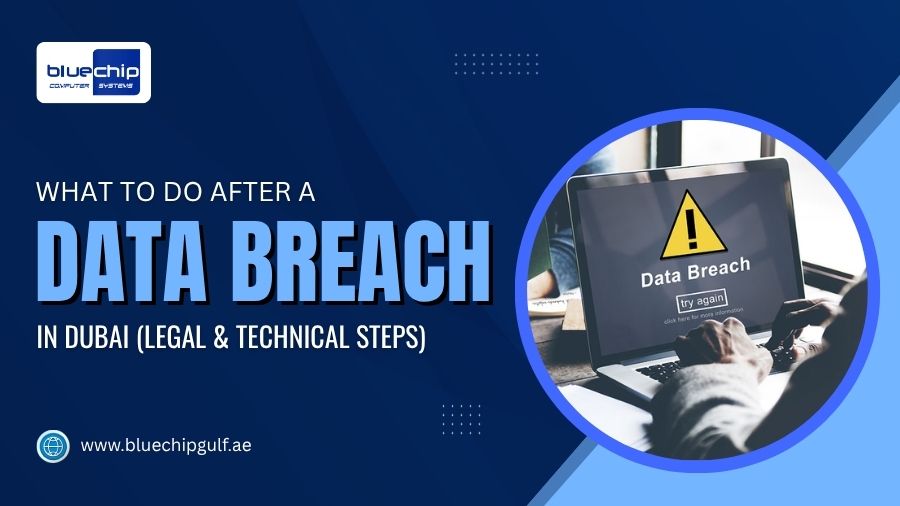
What To Do After A Data Breach In Dubai (Legal & Technical Steps)
For Dubai businesses, securing client and company data is not only good practice – it is a legal need. But what happens when a bad situation happens and you are faced with a data breach? A data breach is when somebody who is not authorized gets access. The result is that your information is compromised, and you have to take action quickly. The best news is that by taking assistance from cyber security companies in Dubai, you can prevent the damage. You can secure the data of your customs and fulfill your legal duties. Let’s find out the vital technical and legal steps to take after a data breach.
Table of Contents
Know The Crucial Steps After A Data Breach In Dubai

The Immediate Aftermath – Technical Triage
1. Contain the Breach
You have to work instantly to prevent the breach from getting worse. This means isolating the impacted systems. Take them offline. Remove them from the network. The purpose is to control the attackers from stealing more data or shifting to other parts of your network.
2. Don’t Turn off Anything
While you have to remove the connection from systems, do not turn them off properly. Turning off a computer can remove useful digital proof that your forensics team will require to find out what happened. You have to constantly run them, but isolated.
3. Assemble Your Incident Response Time
You require a committed team to manage the crisis. This team should comprise the main people from IT, communications, legal, and management. For a more serious breach, you have to bring external professionals. This is where a reputable cybersecurity company in Dubai is beneficial. They have the equipment and specialization to research the breach, find the source, and assist you in recovering.
4. Start Digital Forensics
You have to accurately locate what happened. What was the weakness that the attacker utilized? What information was stolen? A digital forensics investigation will give the right answers. It is a highly technical procedure, and it is best managed by experts from a cybersecurity company who can gather and research proof without destroying it.
The Legal and Regulatory Maze

Once the starting technical reactions are underway, your attention should be moved to legal duties. Dubai and the UAE have clear rules about data security, and you have to comply with them carefully.
1. Understand the Laws – The prime data security rule in the UAE is Federal-Law No. 45 of 2021 on the Protection of Personal Data. This rule requires companies to secure personal data and report breaches. There are also particular rules for free zones like the Dubai International Financial Center.
2. Inform the Authorities – It is a vital legal move. Under the PDPL, you have to inform the Data Office of the UAE about any personal data breach as quickly as you become aware of it. The notification should comprise information about what happened, how many people were impacted, and what steps you are taking to fix it. Delaying this can cause fines.
3. Inform the Affected People – If the data breach is likely to cause a big danger to the freedoms and rights of the impacted people, you have to inform them. This intimation should be clear and straight, explaining what happened, the possible results, and what they can do to secure themselves. This makes trust and presents that you are taking this issue seriously.
4. Maintain a Breach Log – You have to maintain a thorough record of every data breach, even the little ones that do not need to be publicly disclosed. This log needs to include all the information about the breach, the reactions you took, and why you decided to inform or not inform people. It is a main part of showing adherence and accountability.
Communication and Recovery

A data breach can majorly harm your standing. How you communicate and resolve is only as crucial as the technical and legal actions.
1. Communicate with Clarity – Be honest with your clients and the audience. A carefully worded, clear statement can go a long way in reforming trust. Inform them about what happened, what data was included, and what steps you are taking to solve it. Sidestep technical jargon and be transparent about the actions you are taking.
2. Provide Support to Impacted People – Based on the kind of data stolen, you may have to deliver support to your clients. This could comprise free credit supervision services if financial data were compromised.
3. Reviews and Rebuild – After the starting chaos, you have to solve the issues that led to the breach. It is a long-term procedure.
- Enhance security – Utilize the findings from the digital forensics statement to enhance your defenses. This could mean enhancing your firewalls, executing robust access management, or utilizing encryption for crucial data.
- Train your staff – A number of breaches are caused by human mistakes. Be sure your workers are trained on cybersecurity strategies. This comprises identifying phishing emails, utilizing robust passwords, and managing secret data properly.
- Develop a Complete Incident Response Plan – If you have not faced any before, now is the time to make a thorough plan for what to do in the event of a future breach. This plan has to include all the crucial techniques highlighted above.
While understanding what steps to take after a data breach is vital, the finest strategy is to control one from occurring in the first place. This means making an investment in robust cybersecurity standards and performing with experts who comprehend the remarkable risks in Dubai. Connecting with seasoned and reputable cyber security companies in Dubai can deliver the specialization and resources you require to construct a comprehensive defense. They can assist in everything from risk assessments and vulnerability testing to building an around-the-clock supervision hub.
A data breach is a big difficulty, but it is not the end of the world. By taking quick, decisive action on legal and technical fronts, you can secure your company, your clients, and your reputation as well.
Also Read: Outsourced Vs. In-house IT Support: Which Is Best For Dubai SMEs?








